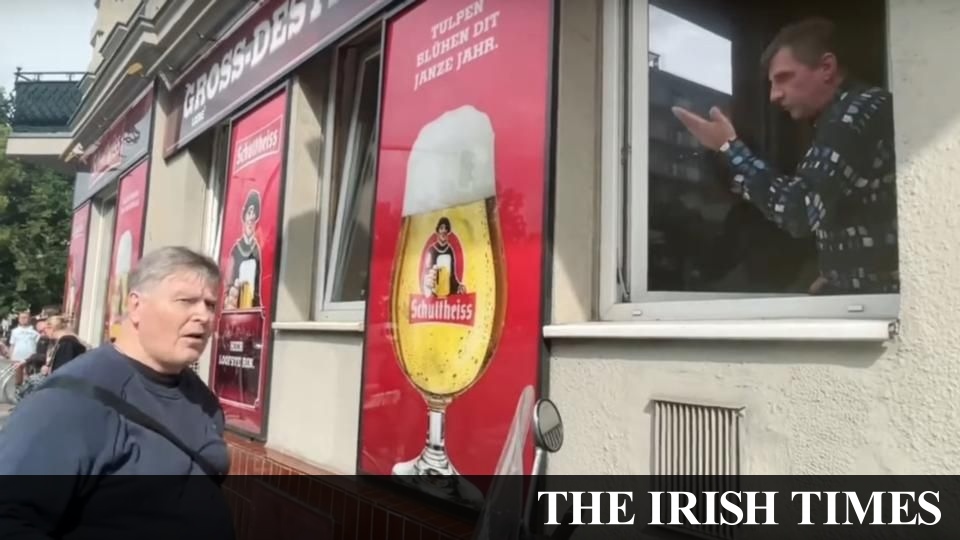Covid conspiracy theorists complicate path to German election

It’s a quiet Monday night in Zur Quelle and the regulars are still discussing their 15 minutes of fame.
Loosely translated as “To the Source”, the Quelle is a dying breed of Berlin bar with a long wooden counter, soft lighting and unique cast of characters on both sides of the counter.
A thirtyish blonde man confides in the ageing barmaid that he’s “on the prowl”. Down the other end, Frieda the terrier is whimpering with loneliness.
Her master and his friends are in the smoking section out back, reconstructing Saturday two weeks ago when, as one put it, they “pushed back against the crazies”.
Berlin was the stage for another demonstration by the Querdenker, so-called “Lateral Thinkers” – a loose alliance of German Covid conspiracy theorists, anti-vaccine activists, lockdown critics and random headbangers.
Marching on foot to the nearby government quarter, many began using the Quelle as an unofficial public convenience.
“They all wanted to use the lav, no one wanted to wear a mask and they started hassling us,” says barmaid Beate. “We locked the door.”
From the window Quelle regular Jens, in a broad Berliner accent, began a debate with one passerby’s claims that the Covid-19 pandemic was a “big pharma takeover”.
“Ach, give up the conspiracy nonsense, I’ve no time for this, it won’t make the virus go away,” said Jens in a clip filmed by a protestor.
“This is East Germany 2.0,” shouted the protestor.
“Have you been arrested? Are you going to prison for demonstrating?” countered Jens, adding: “That’s how it was in East Germany, not here, so don’t tell me anything about East Germany.”
Two weeks after the clip went viral Christian Wohlrabe, another Quelle local, says he knows all about confronting Querdenker.
Sitting at a table near the door, the 43-year-old is a Christian Democrat (CDU) candidate for Berlin’s city-state parliament on September 26th. For him the pandemic and protestors have added pressure to campaigning.
“Each day, no matter where you are, they come to the stand and start talking or shouting, sometimes for half an hour at a time, about conspiracies and the CIA,” he said. “Most of them you can’t reach but some you can, and I try to discuss the pandemic, the measures and their effects.”
CDU leader Armin Laschet had a Querdenker encounter of his own in the eastern city of Erfurt when Thomas Brauner, a local bus driver and Covid denier, crept up behind him and began shouting at him about schools and obligatory vaccinations.
After recovering from his shock, Mr Laschet earned applause for his reply: “I think it’s important for politicians to listen but we can’t allow stand the myth that you can’t express your opinion in Germany.”
As the autumn election approaches, some 63 per cent of Germany’s 82 million residents are fully vaccinated. As a fourth Covid wave creeps in, however, politicians face a dilemma over those who don’t want to get vaccinated – but who can vote on September 26th.
Leaders of the main political parties agree that obliging people to be vaccinated would be counterproductive. Simultaneously, however, Germany’s 16 federal states – largely responsible for the pandemic response – are turning the screws. Accessing indoor areas of bars, restaurants as well as sport and cultural venues now depends on either being Covid-19 vaccinated, recovered or tested.
This week, three states said they will no longer cover wage payments for unvaccinated people forced to go into quarantine. In future they will either have to take paid or unpaid leave instead.
“I don’t see why the taxpayer should cover the cost of someone who doesn’t decide in favour of a vaccination at no charge,” said Mr Jens Spahn, federal health minister, of the measure that has cost €458 million to date.
Germany’s unspoken election strategy has been to nudge voters towards vaccination while ignoring the Querdenker and its new political ally called “The Basis”, which claims to have 27,000 members.
Back in the Quelle, locals are revelling in the response to their no-nonsense pushback.
“Jens was delighted with the reaction to the video, people came in to congratulate him,” says barmaid Beate.
“He got five free beers. What’s not to like?”
*** This article has been archived for your research. The original version from The Irish Times can be found here ***


